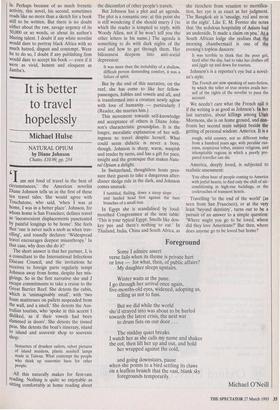It is better to travel hopelessly
Michael Hulse
NATURAL OPIUM by Diane Johnson Chatto, £10.99, pp. 234 Iam not fond of travel in the best of circumstances,' the American novelist Diane Johnson tells us in the first of these ten travel tales. She would agree with Touchstone, who said, 'when I was at home, I was in a better place'. Johnson, for Whom home is San Francisco, defines travel as 'inconvenient displacements punctuated by painful longings to be home'. She feels that 'one is never such a snob as when trav- elling', and roundly declares: 'Widespread travel encourages deepest misanthropy.' In that case, why does she do it?
The short answer is that her partner, J, is a consultant to the International Infectious Disease Council, and the invitations he receives to foreign parts regularly tempt Johnson away from home, despite her mis- givings. So in the first narrative she and J escape commitments to take a cruise to the Great Barrier Reef. She detests the cabin, Which is 'unimaginably small', with `two foam mattresses on pallets suspended from the wall, and a smell.' She detests the Aus- tralian tourists, who 'spoke in this accent I disliked, as if their vowels had been Slammed in doors'. She detests the tinned Peas. She detests the boat's itinerary, island to island and souvenir shop to souvenir shop: Statuettes of drunken sailors, velvet pictures of island maidens, plastic seashell lamps made in Taiwan. What contempt the people who think up souvenirs have for other people.
All this naturally makes for first-rate reading. Nothing is quite so enjoyable as sitting comfortably at home reading about the discomfort of other people's travels.
But Johnson has a plot and an agenda. The plot is a romantic one: at this point she is still wondering if she should marry J (to which the reader is tempted to reply, with Woody Allen, not if he won't tell you the other letters in his name.) The agenda is something to do with dark nights of the soul and how to get through them. Her biliousness deepens into anti-social depression:
It was more than the irritability of a shallow, difficult person demanding comfort, it was a failure of spirit.
But by the end of this narrative, on the reef, she has come to like her fellow- passengers, foibles and vowels and all, and is transformed into a creature newly aglow with love of humanity — particularly J (Reader, she marries him.) This movement towards self-knowledge and acceptance of others is Diane John- son's characteristic groundplan. It is the longer, moralistic explanation of her will- ingness to travel despite herself. What could seem didactic is never a bore, though. Johnson is sharp, warm, waspish and tender by turns, and has a gift for pace, insight and the grotesque that makes Natu- ral Opium a delight.
In Switzerland, thoughtless hosts pres- sure their guests to take a dangerous after- dinner sledge ride in the dark, and Johnson comes unstuck: I tumbled, flailing, down a steep slope . . and landed head first against the bare branches of a small tree.
In Egypt she is scandalised by loud- mouthed Congressmen at the next table: 'This is your typical Egypt. Smells like don- key pee and there's nothing to eat.' In Thailand, India, China and South Africa, as she ricochets from vexation to mortifica- tion, her eye is as exact as her judgment. The Bangkok air is 'smudgy, red and neon in the night'. Like E. M. Forster she notes that 'the sedulous hospitality of Asians had an underside. It made a claim on you.' At a South African lodge she realises that the morning chambermaid is one of the evening's topless dancers: It was terrible to think that the poor girl, tired after the day, had to take her clothes off and jiggle up and down for tourists.
Johnson's is a reporter's eye but a novel- ist's style:
The French are now speaking of auto-fiction, by which the teller of true stories avails her- self of the rights of the novelist to pace the account.
We needn't care what the French call it if the writing is as good as Johnson's. In her last narrative, about killings among Utib Mormons, she is on home ground, and con- fronts her second main subject beside the getting of personal wisdom: America. It is a
rough, wild country, not so different today from a hundred years ago, with peculiar cus- toms, suspicious tribes, sinister religions, and inhospitable regions in which a poorly pre- pared traveller can die.
America, deeply loved, is subjected to realistic assessment:
You often hear of people coming to America with joyful hearts, to find only the chill of air- conditioning in high-rise buildings, or the cockroaches of transient hotels.
Travelling 'to the end of the world' (as seen from San Francisco), or at the very least 'beyond dentistry', turns out to be a pursuit of an answer to a simple question: 'Where might you go to be loved, where did they love Americans?' But then, where does anyone go to be loved but home?


























































 Previous page
Previous page